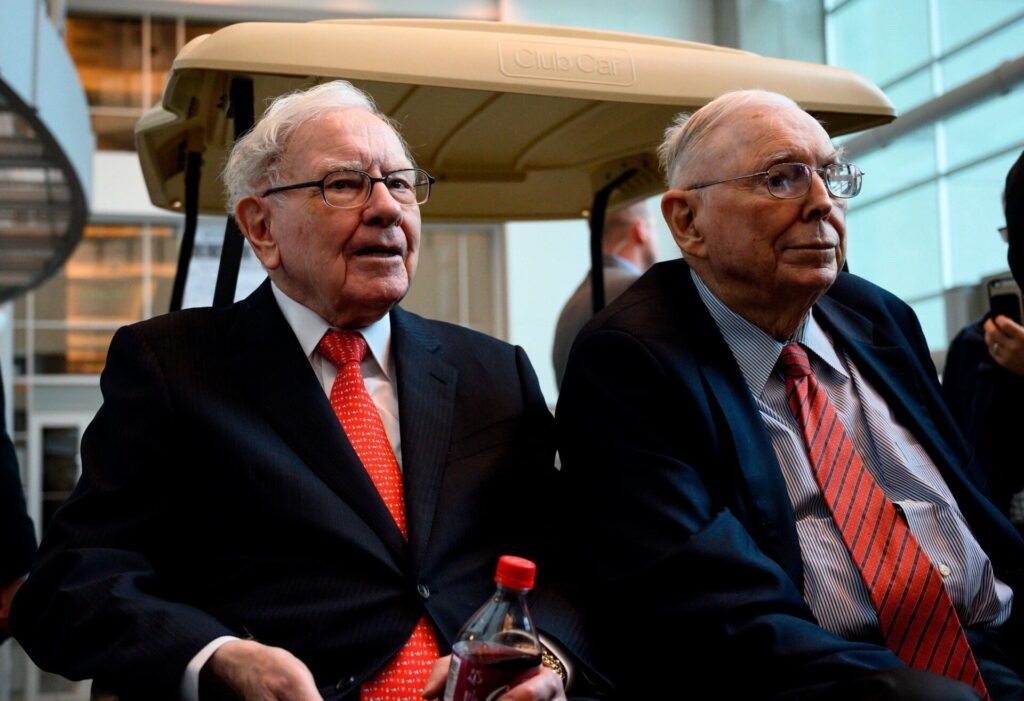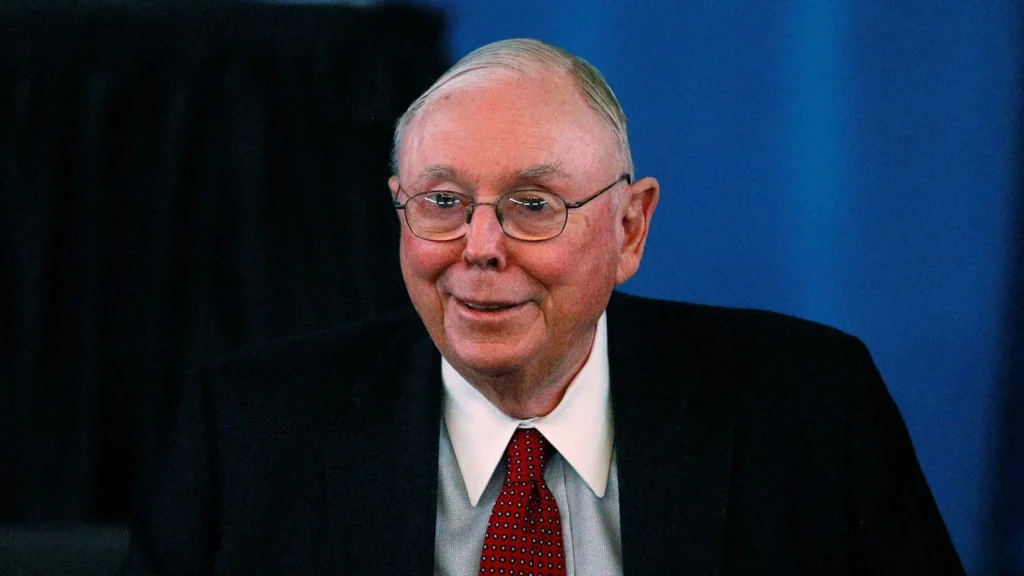In the world of investment wisdom, few voices resonate as deeply as that of Charlie Munger, Warren Buffett’s long-time business partner and Vice Chairman of Berkshire Hathaway. Known for his sharp wit, profound insights, and no-nonsense approach to wealth-building, Munger has shared numerous pearls of wisdom that have become guiding principles for investors worldwide. Among his most impactful quotes is, “You don’t need to own many things to get rich.” This simple yet profound statement summarizes a wealth of knowledge about wealth accumulation, and the art of simplicity.
Charlie Munger’s Most Impactful Quotes and the Wisdom Behind Them

Charlie Munger, the Vice Chairman of Berkshire Hathaway and Warren Buffett’s long-time partner, is known for his wisdom, wit, and sharp insights on investing and life. His quotes are more than just memorable sayings; they are guiding principles that reveal his deep understanding of human behavior, psychology, and sound investing practices.
He also emphasized the importance of accumulating the first $100,000 as the hardest part of wealth building. Here are some of his most impactful quotes, along with the purpose and meaning behind them:
1. “You Don’t Need to Own Many Things to Get Rich.”
Purpose Behind the Quote: Munger emphasizes the importance of focusing on quality over quantity. His point is that wealth is not about having a diverse portfolio filled with many assets but about owning a few high-quality investments that you deeply understand and believe in. This quote reflects Munger’s approach of “concentrated investing,” where he advocates for owning a small number of high-conviction stocks or assets that can compound wealth over time. The purpose here is to avoid “diworsification,” where over-diversification leads to mediocre returns.
2. “The Big Money Is Not in the Buying and Selling, but in the Waiting.”
Purpose Behind the Quote: This quote underscores the value of patience in investing. Munger believes that the greatest returns come from holding onto high-quality investments for the long term, allowing the power of compounding to work its magic. Instead of frequently buying and selling stocks in the pursuit of short-term gains, Munger advises investors to adopt a long-term perspective, resisting the urge to react impulsively to market fluctuations. The purpose of this quote is to encourage disciplined, long-term investing rather than chasing quick profits.
3. “Invert, Always Invert.”
Purpose Behind the Quote: Munger frequently applies this quote to problem-solving, especially in investing and business. It means to think about problems backward and consider what you want to avoid to achieve success. For instance, rather than just asking, “How do I get rich?” ask, “What would prevent me from getting rich?” and then avoid those actions. The purpose of this quote is to encourage critical thinking and a multidimensional approach to decision-making, recognizing potential pitfalls and risks by thinking inversely.
4. “It’s Remarkable How Much Long-Term Advantage People Like Us Have Gotten by Trying to Be Consistently Not Stupid, Instead of Trying to Be Very Intelligent.”
Purpose Behind the Quote: Munger’s humility and realism are reflected in this quote. He suggests that avoiding mistakes is often more important than trying to make brilliant decisions. By consistently avoiding bad decisions—like investing in speculative stocks or businesses you don’t understand—you can achieve success over time. The purpose of this quote is to emphasize the importance of risk management and rational decision-making in investing.
5. “All I Want to Know Is Where I’m Going to Die So I’ll Never Go There.”
Purpose Behind the Quote: This humorous yet insightful quote is another application of the inversion principle. Munger is highlighting the importance of avoiding mistakes and understanding risk. By focusing on what not to do—like engaging in reckless behavior or making uninformed investments—you increase your chances of success. The purpose is to convey that sometimes avoiding negative outcomes is the best strategy for achieving positive ones.
6. “The Best Thing a Human Being Can Do Is to Help Another Human Being Know More.”
Purpose Behind the Quote: This quote reflects Munger’s emphasis on continuous learning and knowledge sharing. He believes that the key to personal and professional growth lies in constantly expanding one’s understanding and helping others do the same. The purpose behind this quote is to encourage intellectual curiosity and lifelong learning, which are fundamental to making better decisions and leading a fulfilling life.
7. “A Great Business at a Fair Price Is Superior to a Fair Business at a Great Price.”
Purpose Behind the Quote: Munger underscores the value of quality in investments. He argues that it is better to buy a great business—even if it’s slightly overpriced—than a mediocre business that seems cheap. The reason is that over the long term, the high-quality business will outperform due to its durable competitive advantages, solid management, and growth potential. The purpose of this quote is to emphasize that investors should focus on the quality of the business rather than getting caught up in the allure of a seemingly cheap price.
8. “The Iron Rule of Life Is That Only 20% of the People Can Be in the Top Fifth.”
Purpose Behind the Quote: Munger highlights the inevitability of statistical distribution and the limits of over-optimism. The 80/20 rule, or Pareto Principle, is at play here—20% of the actions will result in 80% of the results. Munger’s purpose is to remind people to be realistic about their expectations and to focus on the few things that truly matter, whether in investing or life.
9. “Show Me the Incentive, and I Will Show You the Outcome.”
Purpose Behind the Quote: This quote reflects Munger’s deep understanding of human behavior and incentives. He believes that incentives are the driving force behind most decisions and actions. Whether in business, investing, or life, people’s behavior can often be predicted by understanding their incentives. The purpose is to encourage critical thinking about what motivates others and to align incentives in a way that produces the desired outcome.
How to Implement Munger’s Approach in Your Investment Strategy
To apply Munger’s wisdom to your investment strategy, consider the following steps:
- Do Deep Research: Before investing, dive deep into understanding the companies you are interested in. Analyze their business models, competitive advantages, financial health, and future growth prospects.
- Invest with Conviction: Choose a few investments that you believe in strongly. This doesn’t mean putting all your money in one stock, but rather, focusing on those that you believe have the best long-term prospects.
- Think Long-Term: Adopt a long-term mindset. Munger’s advice revolves around the idea of holding investments for decades, allowing the power of compounding to work in your favor.
- Avoid Over-Trading: Resist the temptation to constantly buy and sell. Frequent trading not only incurs higher costs but also often results in poorer decisions driven by emotions rather than fundamentals.
- Monitor Regularly: While Munger advises a concentrated approach, it’s also essential to regularly monitor your investments to ensure they continue to meet your expectations and investment criteria.
Understanding Munger’s Philosophy: Quality Over Quantity
Charlie Munger’s philosophy on wealth and investments is rooted in the idea that quality trumps quantity. When he says, “You don’t need to own many things to get rich,” he emphasizes the importance of owning a few high-quality assets rather than diversifying into many mediocre ones. Munger believes that too many people get caught up in the idea of having a diversified portfolio, which, while important, can sometimes lead to diluting one’s investments with less valuable assets.
Munger advocates for a concentrated portfolio where each investment is carefully chosen based on rigorous analysis, deep understanding, and confidence in its long-term prospects. This strategy is often referred to as “focused investing,” where one invests heavily in a few well-researched opportunities. Munger himself has said, “The idea of excessive diversification is madness,” pointing out that having too many investments often results in owning some bad ones that drag down overall returns.
Munger’s analytical prowess and ability to distill complex ideas into actionable insights complemented Buffett’s more folksy approach, creating a dynamic partnership that lasted over 60 years. Together, they transformed Berkshire Hathaway into a diversified holding company with a market capitalization exceeding $780 billion by 2023. Munger’s passing in November 2023 marked the end of an era for one of the most successful partnerships in investment history, leaving behind a legacy of wisdom and a distinctive investment philosophy that continues to influence investors globally.
How Did Charlie Munger And Warren Buffett’s Partnership Evolve Over Time

Charlie Munger and Warren Buffett’s partnership evolved significantly over the decades, shaping the investment landscape and the philosophy of Berkshire Hathaway.
Early Meeting and Initial Collaboration
The partnership began in 1959 when Munger and Buffett met at a dinner party. They quickly discovered a shared investment philosophy, which laid the groundwork for their future collaboration. Munger was already a successful investor, having managed his own investment partnership from 1962 to 1975, achieving impressive returns that outperformed the market significantly.
Transition to Berkshire Hathaway
In 1978, Munger became the vice chairman of Berkshire Hathaway, a pivotal role that allowed him to influence the company’s strategic direction. His arrival marked a shift in Buffett’s investment approach from a strict value investing strategy, rooted in the principles of Benjamin Graham, to a more nuanced philosophy that emphasized buying high-quality companies with strong competitive advantages and holding them for the long term.
Resilience in Market Challenges
Throughout their partnership, Munger and Warren Buffett demonstrated resilience during market downturns, such as the dot-com bubble and the 2008 financial crisis. Their ability to maintain a long-term perspective and seize opportunities during periods of market fear underscored their investment philosophy. For instance, during the 2008 crisis, they made strategic investments in distressed companies, showcasing their commitment to value and patience in investing
Must-Read Books on Charlie Munger’s Insights and Investment Philosophy
While Munger has not authored a large number of books himself, several books have been written about him that compile his speeches, insights, and approaches to investing and life. Here are some of the most famous books associated with Charlie Munger:
1. “Poor Charlie’s Almanack: The Wit and Wisdom of Charles T. Munger”
- This book is the most comprehensive compilation of Munger’s life philosophy, speeches, and teachings. It is filled with his investment insights, mental models, and decision-making frameworks. The book is modeled after Benjamin Franklin’s “Poor Richard’s Almanack” and is highly regarded among investors and thinkers alike. It is a must-read for anyone looking to delve deep into Munger’s thinking and approach to life and business.
2. “Charlie Munger: The Complete Investor” by Tren Griffin
- This book provides an excellent overview of Munger’s investment philosophy and his thoughts on value investing. It distills Munger’s key concepts, such as the importance of mental models, the power of compounding, and the need for a multidisciplinary approach to decision-making. The book is accessible to both novice and experienced investors, offering practical advice on how to apply Munger’s principles.
3. “Damn Right!: Behind the Scenes with Berkshire Hathaway Billionaire Charlie Munger” by Janet Lowe
- This biography offers a behind-the-scenes look at Munger’s life, career, and partnership with Warren Buffett. It provides insights into his early years, his time as a lawyer, and his transformation into one of the greatest investors of all time. The book also delves into Munger’s personal life, including his tragedies and triumphs, and provides a comprehensive look at his character and intellect.
4. “On Success: Reflections from Charlie Munger and His Friends”
- This book is a collection of reflections and thoughts from Charlie Munger and his friends, covering various aspects of success, decision-making, and investing. It’s not as comprehensive as “Poor Charlie’s Almanack,” but it provides valuable snippets of Munger’s views on life and business, making it a good read for those interested in his personal philosophies.
5. “Seeking Wisdom: From Darwin to Munger” by Peter Bevelin
- While not written by Munger himself, this book is heavily influenced by his teachings and philosophy. Peter Bevelin explores the concept of mental models and how they can be applied to improve thinking and decision-making. The book draws from various disciplines, including biology, psychology, and economics, much like Munger’s approach to solving problems using a multidisciplinary mindset.
Why These Books Matter:
These books provide a window into Charlie Munger’s brilliant mind and investment strategies. They offer a wealth of knowledge on how to think critically, make better decisions, and apply a multidisciplinary approach to investing and life. For those looking to learn from one of the greatest investors and thinkers of our time, these books are essential reads.
What are the Famous Books About Charlie Munger?
Books about Charlie Munger include “Poor Charlie’s Almanack: The Wit and Wisdom of Charles T. Munger” by Peter D. Kaufman, which offers insights into Munger’s philosophies and strategies, and “Charlie Munger: The Complete Investor” by Tren Griffin, which explores his investment principles and achievements.
How did Charlie Munger die?
Berkshire Hathaway announced that Charlie Munger passed away peacefully at a hospital in California, where he resided. The cause of death was not disclosed.











